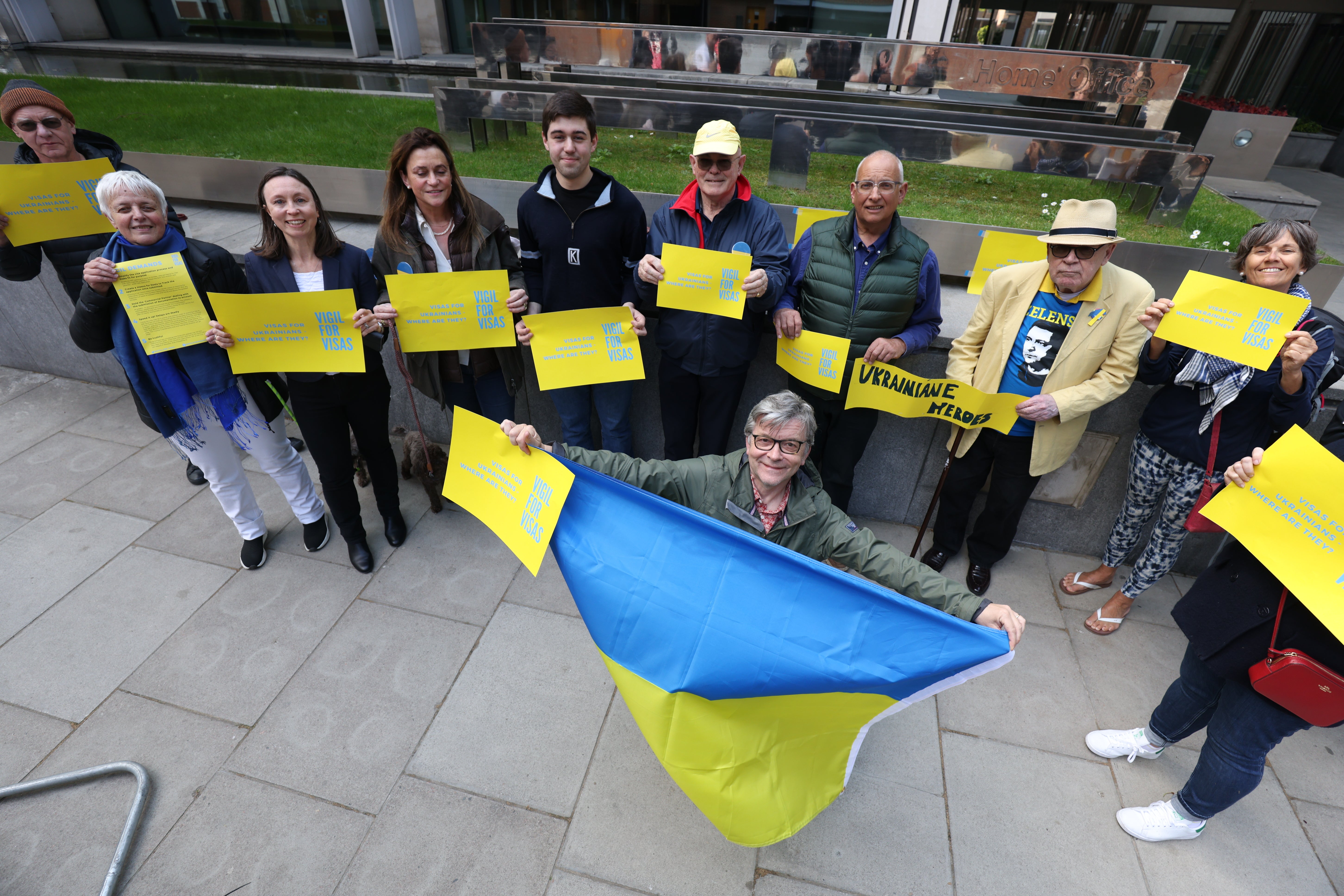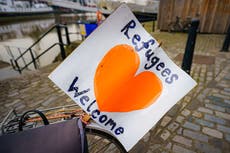Some Ukrainians never made it out of besieged cities due to wait for UK visas, says Ukrainian MP
Britain accused of putting refugees at greater risk by failing to give accurate visa timeframes
Some Ukrainians who applied for visas to flee to the UK got trapped in besieged cities because they were waiting for a decision on whether they could come, a prominent Ukrainian MP has said.
Speaking at an event on Thursday alongside the UK refugees minister and the Ukrainian ambassador, Lesia Vasylenko, the people’s deputy of Ukraine, warned of the devastating impact of the delays faced by applicants to the Homes for Ukraine scheme.
She suggested that UK ministers had misled refugees on the timeframe they could be expected to wait, and subsequently placed them at greater risk.
“In March, when I was in the UK I was in a meeting with Priti Patel at the Home Office, she was sitting across the table from me and she said it would take maximum three days. But no, actually the average is two to three weeks,” said Ms Vasylenko.
“That’s not okay on many levels […] Some people are in temporary accommodation, some remain in cities that have been in cities under attack and just managed to get out, and some never actually made it in the end to the UK because they got trapped in cities like Kherson or Mariupol.”
Ms Vasylenko added: “It’s better to give people a proper timeframe. Two weeks is two weeks, three weeks is three weeks. At least they know where they stand and people can make their decisions accordingly.”
Government data published on Thursday shows that 33,000 people have arrived under the Homes for Ukraine scheme, which enables Ukrainian refugees to come to the UK to live with people offering to host them. This accounts for 40 per cent of the 84,400 who have applied.
Also speaking at the event, Vadym Prystaiko, the Ukrainian ambassador to the UK, reiterated his calls for the UK to waive visa restrictions.
“I believe that at this moment, as has happened in all European nations, we should allow Ukrainians to come here and then to deal with the security checks, because sometimes they’re fleeing cities under bombardments, there’s no time to wait 60-80 days,” he said.
The UK’s refugees minister Lord Richard Harrington acknowledged that there has been “a lot of pressure” on Ukrainian people who have applied to the “complex” visa scheme, admiting many were “waiting in the ether for far too long”.
“I said this from the first day and I take responsibility for it. This is not a politician ducking out of it,” he added.
“I promised to get to a level where we process between 15,000 and 20,000 within 48 hours. The form is now much simpler than it was. Most cases should get an email with permission to travel within 48 hours. I’m hoping that will be the norm.”
During the event in London on Thursday, hosted by think tank UK Onward, concerns were also raised about what is happening to Ukrainian refugees once they arrive in Britain, particularly families falling homeless because hosting placements have broken down.
Ms Vasylenko said she had spoken to Ukrainian voluntary groups in the UK who report Ukainians coming to them saying they are homeless because they’ve been “kicked out by their hosts”.

“Okay, circumstances change, something goes wrong with the relationship - but there must be some kind of back-up plan from the UK government. Where do these people go?” she asked.
“The hosts have no legal duty to keep the Ukrianinan family, but at the end of the day we have Ukrainian families out on the streets. What happens to them? [...] The UK government is doing a lot, but it could do more.”
The ambassador criticised the UK government for failing to share information about Ukrainian refugee arrivals with the embassy, which he said put embassy staff in a “very difficult position” as they are unable to provide support people.
“Unfortunately as an embassy we cannot help people if we do not have access to the information. I know we have to protect the personal information of people coming to the UK, but the circumstances are very different now,” he said.
“We’re talking about tens of thousands of people coming here and my consular office has to have their information – but we don’t.
“We can’t address and inform our people, we can’t reach out to them with information [...] I would like the government to allow us to have access to the database of our own citizens who are coming here.”
Lord Harrington conceded that the scheme was “not perfect” but was “improving day-by-day”, adding that his “vision” is for the Homes for Ukraine model to be made available from refugees fleeing other parts of the world.
“[It would mean that] when refugee crises happen – and unfortunately they do – we have the machinery [...] We’ve got a lot of goodwill, we’ve got this machinery of government in place now, and I hope it will become a permanent part of how this country deals with refugees, because when that doesnt happen, we find problems,” he said.
Join our commenting forum
Join thought-provoking conversations, follow other Independent readers and see their replies
Comments


Bookmark popover
Removed from bookmarks